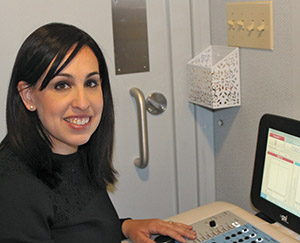
Getting a hearing aid is a very different experience from getting glasses, with more emotional baggage and requiring more fine-tuning over time. Vision correction is also sometimes viewed as less of a stigma than hearing correction. For these and other reasons, people often choose to consult an independent audiologist rather than an ENT (or their own in-house audiologists), in order to receive the personal consideration and time necessary to optimize this sensitive and individualized process.
Recognizing this need, audiologist Ariela Frisch, MA, CCC-A, started her private practice in Teaneck almost two years ago after working in NYC for over 10 years. Frisch Audiology (www.frischaudiology.com) prides itself on providing auditory health care in a warm, personalized, and nurturing environment. “Here in New Jersey (unlike New York), where it is legally permissible for ENTs to profit from selling hearing aids, these large, busy, volume-based practices often use onsite audiologists to sell hearing aids, and are focused on seeing as many patients as quickly as possible,” she said. “I wanted to provide more support, time, and attention, so I started my own patient-focused audiology practice, where I have the flexibility to spend as much time as necessary and to develop relationships to ensure that the client has the best possible experience.”
Frisch Audiology offers a full range of diagnostic and rehabilitative audiological services for all ages, including comprehensive hearing tests, middle-ear testing, otoacoustic-emissions testing, the latest hearing-aid technology, and auditory-processing evaluations. It also offers preventative care, education, and a full range of custom ear plugs to assist in everything from noise reduction to swimming, to recreational listening.
“People often mistakenly think they must go to an ENT first,” she said. “The truth is that while the first time you get a hearing aid you need medical clearance, after that, you don’t. And even the first time, you don’t have to use their in-house audiologist. For this type of experience, you want an audiologist that you feel comfortable with.”
A consultation with Frisch, whose offices are located at the Teaneck Speech & Language Center at 107 W. Tryon Avenue, includes three main components: assessment of hearing loss, lifestyle, and budget. The first fitting is based on the amount of hearing loss. Two weeks later, there is a follow-up appointment to evaluate how the device reacted in different environments and to tweak the programming according to the client’s needs. “Some people prefer to hear all the background noise in a restaurant, others want to filter that out. People with a lot of interpersonal interaction might need a different device than someone who mainly stays at home. There are devices for listening to music, ones that can connect directly to your cell phone, different safety features for infants and toddlers… I can help determine what makes sense for you at each age and what stage you’re in.” She adds: “It takes at least a month to fully adapt to a hearing aid. We are there every step of the way to provide the best transitions, and we have a 60-day trial period.”
Frisch is fully licensed to dispense hearing aids and can recommend and fit all levels of amplification. She is also certified by the American Speech and Hearing Association and is a Fellow of the American Academy of Audiology.
“Some people might be hesitant at first,” she says. “But when they receive the time and attention they need, and their individual requirements and preferences can be carefully assessed and re-assessed, they become more enthusiastic about the amazing current technology (these are not your grandfather’s whistling hearing aids), and ultimately feel pleased and supported.”
By Lisa Matkowsky










